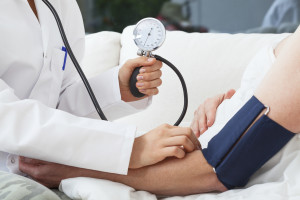The Symptoms of High Blood Pressure
 High blood pressure, also known as hypertension, is the most common cardiovascular condition that can affects infants and adults. Normally, the heart can efficiently pump blood throughout the body, but certain circumstance may force the heart to pump harder to ensure proper circulation. As pressure elevates, it increases the odds that the arteries could be damaged (similar to a garden hose after water pressure builds beyond a point).
High blood pressure, also known as hypertension, is the most common cardiovascular condition that can affects infants and adults. Normally, the heart can efficiently pump blood throughout the body, but certain circumstance may force the heart to pump harder to ensure proper circulation. As pressure elevates, it increases the odds that the arteries could be damaged (similar to a garden hose after water pressure builds beyond a point).
As common as this issue can be, most people will not experience any noticeable signs or symptoms. Clinical studies on hypertension have shown that this can remain true even when a subject’s blood pressure is nearing lethal levels.
Some Quick Facts About Hypertension
- High blood pressure is the leading cause of stroke
- It is one of the most common causes of heart attacks
- At least 30 percent of American adults have hypertension
In most cases, people are diagnosed with high blood pressure by their doctor when they come in for a routine physical. Here’s a quick breakdown of what’s considered a normal blood pressure reading compared to a high blood pressure reading:
100-140 mmHg systolic pressure = normal
60-90 mmHg diastolic pressure
≥ 140 mmHg systolic pressure = hypertension
≥ 90 mmHg diastolic pressure
(The systolic measurement calculates the cardiac muscle contracting (systole) and the diastolic measurement calculates the relaxing of the cardiac muscle (diastole) between heartbeats.)
As you may have already garnered, one of the most dangerous aspects of this cardiovascular condition is that you could be living with it without having any clue. The best way to protect yourself from this threat is to make healthy lifestyle choices and get regular checkups. It’s highly recommended if you have any family members who’ve been diagnosed with hypertension.
Common Indications of Hypertension
While most cases are asymptomatic, the following signs could indicate that your blood pressure is relatively high:
- Vision problems
- Unexplained fatigue or confusion
- Chest pain
- Severe headaches
- Irregular heartbeat
- Issues breathing
- Strange pounding in the chest, neck, or ears
- Blood in the urine
These symptoms should not be ignored, so please be sure to schedule an appointment with your doctor right away. In some rare cases, these could be caused by a blood pressure crisis which is actually signaling an impending stroke or heart attack.
When high blood pressure is not immediately treated, it could lead to:
- Heart disease
- Kidney failure
- Eye problems
There are a variety of medicinal treatments that can help people lower their blood pressure, and your doctor and cardiologist will determine what the best course of treatment will be given your condition. However, we recommend striving to maintain a better diet and lifestyle in order to ensure that your heart stays healthy for the long run.